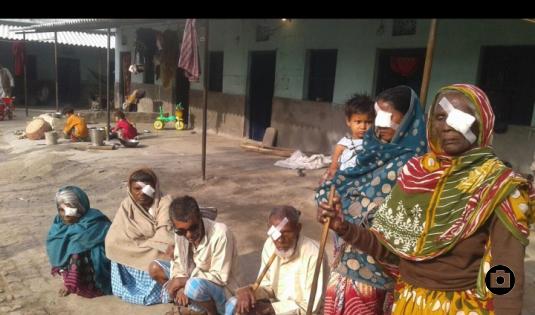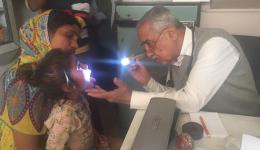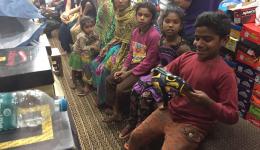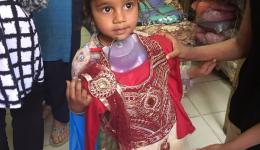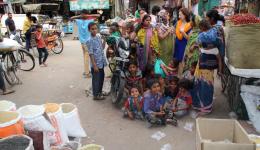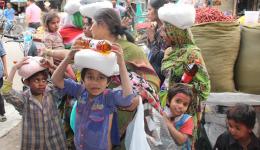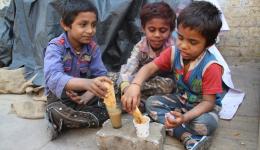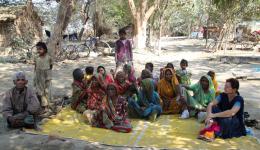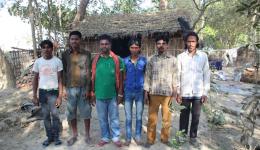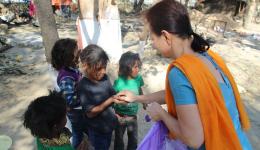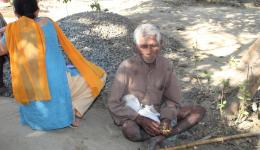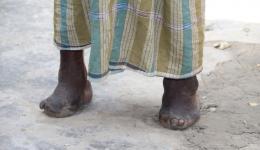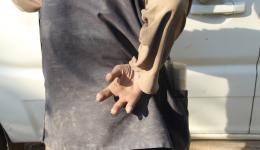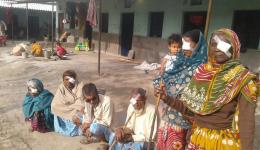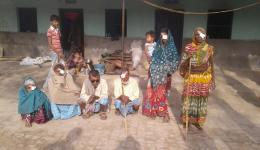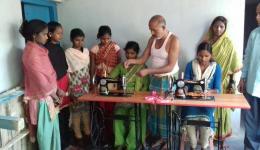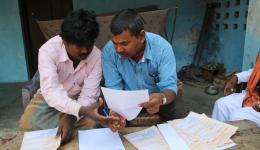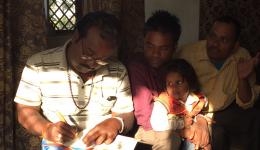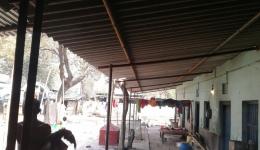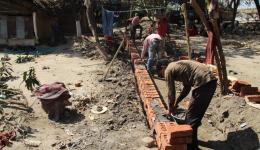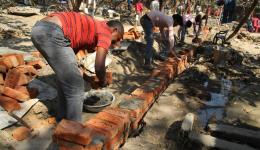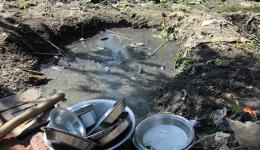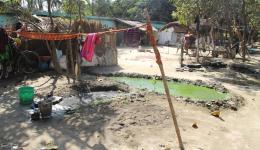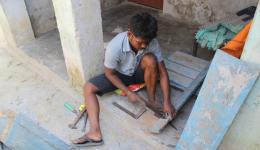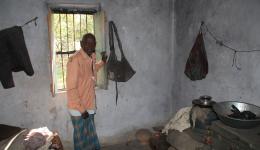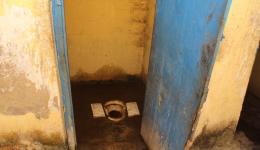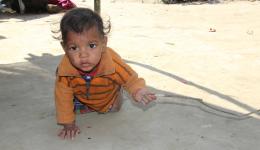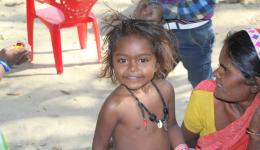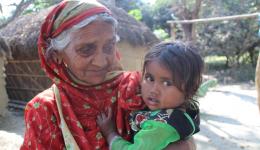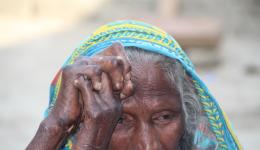Registered Nonprofit
Association for the Support
of Children and Needy
People Around the World
Unterstützung
Living on the street, leprosy villages in Bihar
Fri, April 14, 2017 - 10:30pm, written by Alexandra, published by Frank
Last photos of the trip
While we are sharing some last impressions of the tour to India in March 2017, Katrin and Ludmila are already traveling through Nepal where a workshop for young men and women from the "caste of the untouchables" will be built.
THANKS for the great support from ALL our friends and thousand thanks to ALL your loving comments and likes on Facebook. These are VERY encouraging for our teams !!! It's good to know that we are in your mind ... !!!
Thur, April 4, 2017 - 7:30pm, written by Alexandra, published by Frank
Measuring catastrophes in figures - a somewhat different approach
When natural catastrophes, wars and famines are the „order of the day“, when people are fleeing into the unknown without knowing whether they will ever see their loved ones alive again, one or the other reader might ask the legitimate question: "Why is one of the main focus of the work of FriendCircle WorldHelp the support of lepers? And why offering help e.g. in India?"
First of all, we want to state that there will never be enough helping hands anywhere in the world. Even the small things of life often contribute to alleviate a problem.
At the beginning of the work of FriendCircle WorldHelp, i.e. some 10 years ago, when Michael and Alexandra set out by themselves to the state of Maharashtra, India, soon a motto emerged: "In search of poverty". We quickly realized that not everything that seems “poor” in Western eyes can really be called poverty.
On the contrary, we observed major differences in people’s lives. Situations and conditions that appeared after consideration no less worth living than the living conditions we are used to. Our “studies” just required a different view on things in order to understand that life in other countries can be attractive and interesting and offers the viewer quite a lot of opportunities for learning.
Still there are, of course, many occasions that move a human heart and leave us paralyzed for a moment:
An 8-year-old girl in rags searching something to eat at 4 o’clock in the morning in the food waste of a stationary train.
A 13-year-old boy who is missing both legs up to the hips, “sitting” on a roller board and moving forward with his hands.
Children sniffing Uhu (glue) at the train station in order to forget their empty stomach and the missing love.
Somebody without arms begging on the roadside – only his head can show that he needs something.
People in leprosy villages crying because somebody perceives them as human beings and not as lepers.
Every day we are confronted with new horror stories. In the light of the press, the crises in the world appear like shooting stars in a clear summer night lighting up shortly one after the other and disappearing just as quickly.
The magnitude of catastrophes is measured in figures. The more people lose their lives, the more escape from one place to the other, the more extensive the problem is, the more urgent the priority of taking care of it. In the short term, governments and relief organizations concentrate their support on those places where the world is looking at through the media. As soon as the attention is directed elsewhere, the problem seems to have been solved superficially.
What does a homeless street child strolling without any perspective through Indian streets possibly think about this classification?
Or the mutilated one treated as outcast in the more than 800 leprosy villages in India?
Nothing, for they know nothing about it. They also do not know that they will never be considered with this type of classification.
At least this he has got: The ignorance and in the end the hope that perhaps at some time a miracle will happen.
Wed, April 5, 2017 - 9:30pm, written by Alexandra, published by Frank
What happened to Ashok?
In November 2016 our team visited for the second time a leprosy village called Bhairoganj. At that time we wrote the report: "Death came too early". We were deeply touched by the fate of the 28-year-old whose young wife left him with three young children when she died at the birth of the fourth child. (report 11/2016).
When Susanne and Alexandra visited the same village again we met a completely different Ashok. The man who in November had been sitting in front of us with his shaved head, drowned in tears is now looking at us with renewed energy. Ramavaraj, our Indian friend who takes care of the needs of the colony in the name of FriendCircle WorldHelp and supervises the work, reports that Ashok would call him every day asking if he did everything right.
Ashok has found new hopes and perspectives for his life which are worth continuing. On a tour the men proudly show us the new iron doors which were installed to keep animals and thieves away so that they cannot steal the little property. Also windows have been completed for almost all rooms so that wild cats can no longer penetrate at night.
Ramavaraj and Venu had suggested recycling the wood of the old doors, which would make the windows less expensive. This proposal was professionally put into practice by a carpenter who is paid some 6 Euro a day.
The hand pump for the well that had been installed in summer is still working flawlessly.
While in our presence the construction of a kind of overground sewer system (gutter system) is started, Susanne hands out sweets to everybody. Both young and old are overjoyed! In the end, we are all a bit of a child…- THANKS to ALL friends at home who are enjoying with us the little things of life that can be so much bigger in the hearts of people.
(to be continued…)
Mon, March 13, 2017 - 9:30pm, written by Alexandra, published by Frank
Living on the street - Delhi
Since February 28, our next team (Susanne and Alexandra) has been traveling to India. The first destination is Delhi. Temperatures are moderate; it is warm during the day. Susanne still has her clothes from the last trip to Nepal, so we start slowly into the first day with small errands.
In the hustle and bustle of Pahar Ganj, the market streets opposite the Delhi railway station, children are approaching us: „Paisa?“ – „small money?“.
Paisa is the small Indian money from ancient times. At that time, 100 Paisa made a rupee (= about one and a half cents). While this currency has long since ceased to exist, the term is now being used as an invitation meaning: „give me money“.
Whereas compassionate tourists at first generously reach into their pockets overcoming the first shock and thereby possibly soothing a kind of long-standing „bad conscience“ the recipient seems not so much impressed by what he gets. His face rather shows indifference and numbness and another busy „Paisa“ is heard which means „give me more“.Other children having watched this spectacle also want to have their share pushing near the giver and if necessary pulling the tourist’s shirt to increase their chances..Now at the latest every reasonable human being will feel uneasy and the urge to escape this unpleasant situation as quickly as possible.
Such and similar experiences are the contact points worldwide between people who have never succeeded to get away from the street as their home and the rest of our civilized society. Following such experiences not only the „normal“ tourist decides to better keep distance. The Indians as well seem to be satisfied with the fact that the tedious „beggar clientele“ is part of the cityscape and cannot be avoided. If the problem comes too close so that one might be afraid that a hungry child could steal something, it is chased away with a stick.If possible, people also want to have nothing to do with subjects related to problems which in this huge country of contrasts also exist such as child trafficking, child prostitution, physical and psychological ill-treatment, drug consumption and more.
Here, Karma, fate, comes into play „What you sow, is what you reap“, one might say to draw a comparison with what is familiar and known in the West. Here in India it means that previous actions are the reason for the present life. A rich man has earned his prosperity by good deeds in his last life or previous lives. Being poor is the result of earlier actions. This is a reasonable but very simplified view of life which inevitably leads to the preservation of that obscure, insurmountable wall that separates people from each other. FriendCircle WorldHelp’s philosophy consists in questioning common patterns.The first step in this direction leads invariably to the question: „Is it useful or are we at all entitled to stick to established norms that have evolved and established in the culture and society over a certain period of time without being properly questioned? For us, the obvious answer leads us into the everyday situations of those who usually function almost like little dressed machines saying „Paisa, Paisa“.
After a short conversation with hands and feet we are sitting in a cafe where our small and grown-up companions are allowed to enthusiastically order fine food until all are “fed up”, and after that fresh fruit juice.
As if we had never been strangers, the mothers snuggle closely to Susanne, while the children are stuffing rice into their mouths. Smiles spread on the previously sad and dissatisfied faces.
The smallest child does not eat even though his mother repeatedly urges it. „What is going on?“, we ask. „Problem“, the mother says pointing to the girl’s mouth. When prompted, the child opens his mouth: there is a large white area on the tongue which looks like “burnt” to us. „Have you been to the doctor?“, Alexandra asks. „No, no money!“, is the simple answer. (The restaurant owner is so kind to translate) „Okay, where is the next doctor?“ „Just a few houses further down“, the friendly gentleman at the cash desk explains.
Together we walk to the small „open“ practice where some 12 to 15 people are already waiting for their turn, sitting on shaky wooden benches. The small room is about 5 square meters large. In the evening it is closed by a kind of garage door, and on its end the white-haired doctor is gracefully sitting on an old wooden desk.Right in front of his desk are the benches on the left and right side where people sit and wait patiently. Behind the doctor is a door lovingly wrapped by a curtain of floral patterns. Every now and then another man as old as the doctor himself holds out his head, passes on information to the doctor or receiving instructions from the doctor. As soon as a patient has been examined, this man briefly explains the selected remedy and how to take it.
One after the other of the queue of waiting people slips forward, but the queue does not appear to shorten because there are always new patients arriving.
Everyone, at least those who understand Hindi, is listening to the diagnosis and treatment of his predecessors. This phenomenon is common in India and we have often observed it on our journeys.
Also the mother of our little patient is exactly explained the use of the different vials she now holds in her hands. „How much?“ Alexandra asks as we are leaving. „120 Rupees (=1,74 €)“ we are told. We pay and leave.
To establish relations to people burdened by prejudices by the surrounding society demands to open up to a previously unknown walk of life and to face the fact that all possible answers will be followed by further questions:
„Was it by ignorance that the mother did not bring her child to the doctor?“
„Did she really not have this apparently small amount of money?“
„Would the doctor possibly have sent her away if we had not accompanied her?“
„Maybe the doctor would not have asked for any payment if he had realized the mother’s situation.“ (We often experienced also this reaction as well).
„Or did the mother feel ashamed to wait on the bench next to the other better-placed patients?“
We do not know and probably will never know.
In the course of the next few days we have many pleasant contacts. In the shoe shop, in various clothes shops, in the grocery store where we buy bulk food for seven families for at least one week which we carry on all the way.
We want to know more, therefore we drive by taxi, together with Venu and some of the street children to their home. „Have you ever driven by car?“, we ask. „No, how could we!“ they answer directly.A few corners further along the road side our other friends have already arrived with the Riksha which we had paid in advance and in which the rest of the team had squeezed in.
„Here, this is our home.“ On the wall of a sidewalk, under dusty plastic covers, things which we cannot identify at first are piling up about one meter high..„What is under this?“, we ask. The women pull out further plastic sheets, plastic boxes and other „worthless“ material.
„Where are you cooking?“, Alexandra wants to know. We are led about four meters further around the corner. There is again a pile of things protected by plastic sheeting. We have a closer look and find bags underneath containing old worn-out pieces of cloth as well as the new clothes which we just bought in shops, together with the families.
We are shocked. We had at least expected some kind of shelter of bamboo rods with a roof. „Here we cook“. A hand points to a small fire hole in the sidewalk with two or three metal pots.
After further questioning we learn that there is a public shower a few meters away. One wash where at the same time the clothes are cleaned by hand costs ten cents.A large water tank which is regularly filled by the government stands right next to the cooking area. Probably one of the reasons for families to set up their camp here.
The day is drawing to a close. At farewell, big brown children eyes look at us gratefully and trustingly. We do not know what thoughts are in this moment in the minds of these little human beings. But the expression of their faces covered with dust and dirt is now different from yesterday’s when we first met them.
However complex living on the street may seem from our point of view, it is so easy to break through the seemingly unsurmountable, if one does not look at the beggar’s appearance but at the human being behind.
Everywhere there are millions of differences in our world. These differences are real, but they separate us from each other by terms like karma, fate or whatever it may be called leading to some justification of the given social and individual situation. In the end, however, it is, at least in our opinion, humaneness and compassion that make life more beautiful and rich on both sides.
